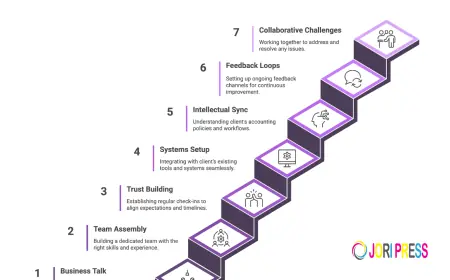Why More US Businesses Are Replacing In-House CFOs with Virtual CFOs?
More US businesses are replacing in-house CFOs with virtual CFO services for cost savings, expert support, and flexible growth. Discover how virtual CFOs offer smarter financial leadership.

In today's fast-paced financial landscape, a growing number of companies across the United States are transitioning from traditional, in-house CFOs to virtual CFO services. But what’s behind this shift? Is it just about cost savings, or is there more to the story?
What Is a Virtual CFO and How Does It Differ from an In-House CFO?
A virtual CFO (Chief Financial Officer) is a remote financial expert or team who provides strategic financial management and planning without being a full-time employee on your payroll. They typically work part-time, on a contract, or through an outsourced CFO service provider.
In contrast, an in-house CFO is a full-time executive hired within your company, often with a significant salary, benefits, and overhead costs.
So, what's driving the switch? Let’s break it down.

1. Cost-Effective Financial Leadership for Growing Companies
Hiring a full-time CFO in the United States can cost anywhere from $150,000 to $300,000 per year, depending on your location and industry. For startups, small businesses, or companies in transition, that’s a major investment.
Virtual CFO services offer a flexible, scalable alternative—giving you access to expert-level financial guidance without the full-time cost.
Key Benefits:
1. No employee benefits or payroll taxes
2.Pay only for the services you need
3.Easily scale up or down based on your growth
2. Access to Diverse Expertise and Advanced Financial Tools
Many virtual CFO providers bring a team of specialists with diverse skills in:
1.Financial forecasting
2.Tax strategy
3.Risk management
4.Compliance
5.Cash flow optimization
They often use modern cloud-based accounting software and financial dashboards, offering real-time insights to help you make better decisions faster.
3. Focused Strategy Over Routine Tasks
While an in-house CFO often gets pulled into day-to-day tasks, a virtual CFO is typically more focused on strategic outcomes.
They help you:
1.Set realistic financial goals
2.Develop long-term growth strategies
3.Navigate funding or investor conversations
4.Plan exit strategies
This strategic edge is especially valuable for high-growth US companies aiming to scale.
4. Flexibility for Modern Business Models
The US business ecosystem is changing—fast. With remote teams, distributed workforces, and cloud operations, the need for a physical CFO presence is fading.
Virtual CFO services align perfectly with this trend, giving you flexibility to operate and scale without being tied to a single location.
Whether you’re based in California, Texas, New York, or Florida, you can access top-tier CFO support from anywhere.
5. Faster Onboarding and Results
Unlike hiring an in-house CFO, which can take months, virtual CFOs are ready to plug into your business almost immediately.
Many virtual CFOs come equipped with:
1.Pre-built reporting templates
2.Established workflows
3.Industry benchmarks
This allows them to deliver insights and improvements within weeks—not quarters.
Who Should Consider Virtual CFO Services?
Virtual CFO solutions are ideal for:
1.Startups in need of financial planning but not ready for a full-time CFO
2.Small and medium-sized enterprises (SMEs) looking to cut overhead costs
3.E-commerce or tech businesses with remote operations
4.Companies preparing for fundraising, M&A, or exit strategies
Final Thoughts: Is It Time to Rethink Your CFO Strategy?
In a time when agility, cost-efficiency, and expert support are critical, it’s no surprise that virtual CFO services are quickly becoming the go-to choice for US businesses.
By replacing an in-house CFO with a virtual one, you gain:
1. Financial clarity
2.Operational efficiency
3.Strategic flexibility
4.Cost control
What's Your Reaction?
 Like
0
Like
0
 Dislike
0
Dislike
0
 Love
0
Love
0
 Funny
0
Funny
0
 Angry
0
Angry
0
 Sad
0
Sad
0
 Wow
0
Wow
0















































